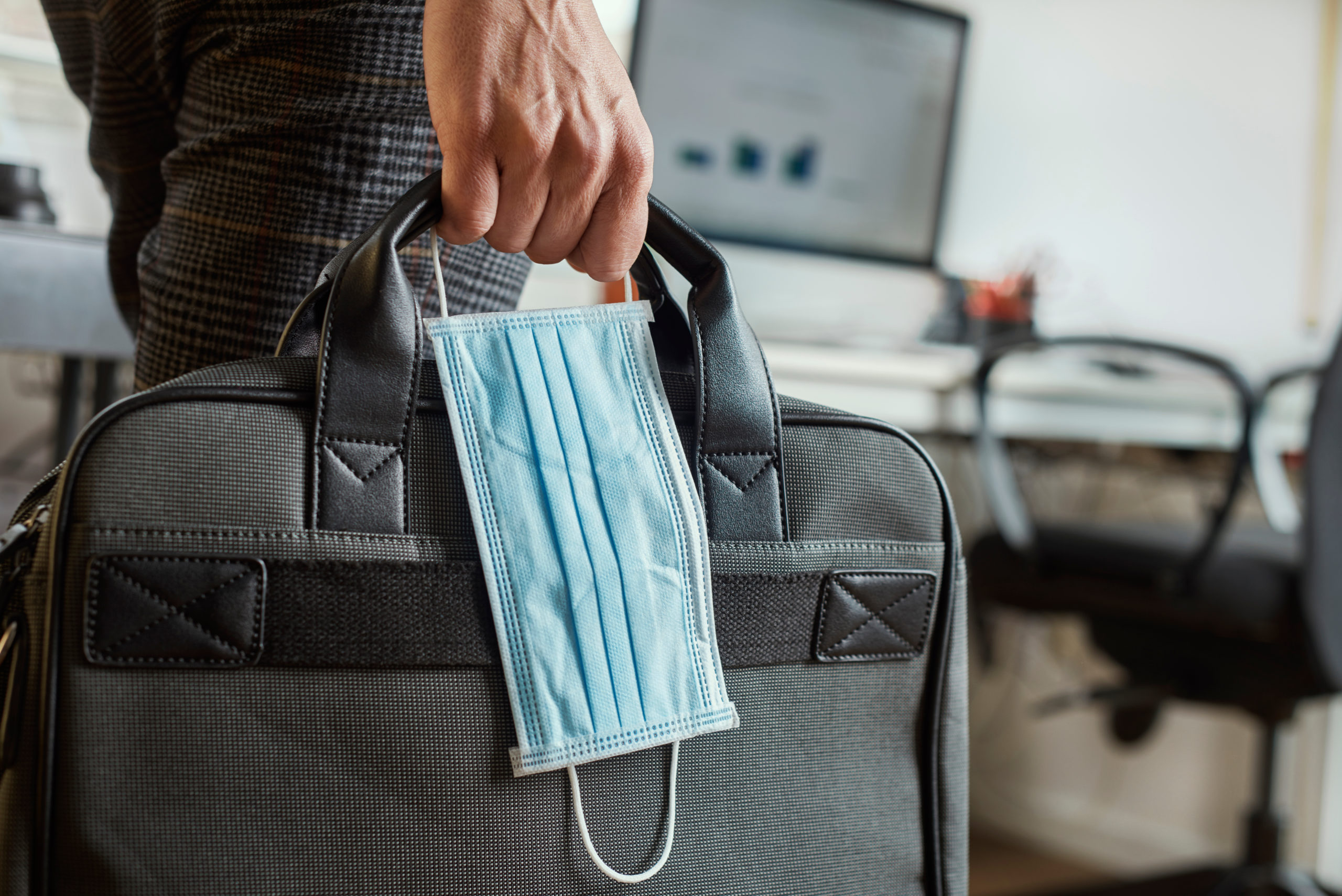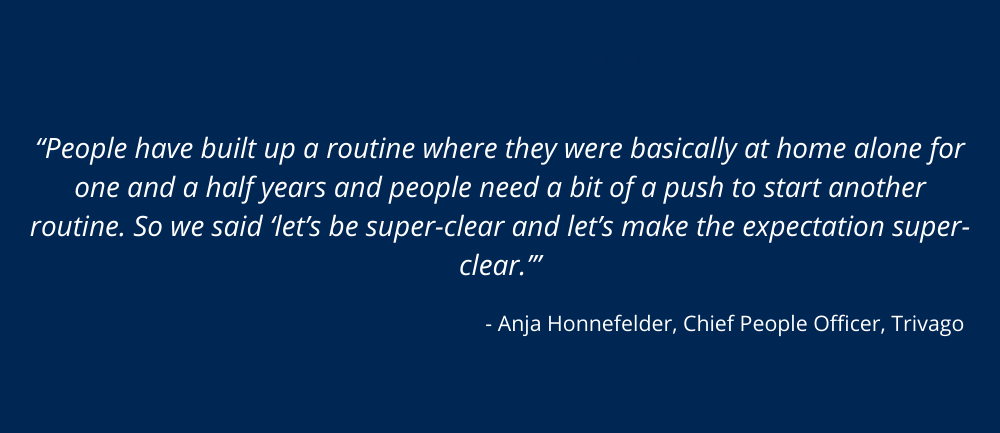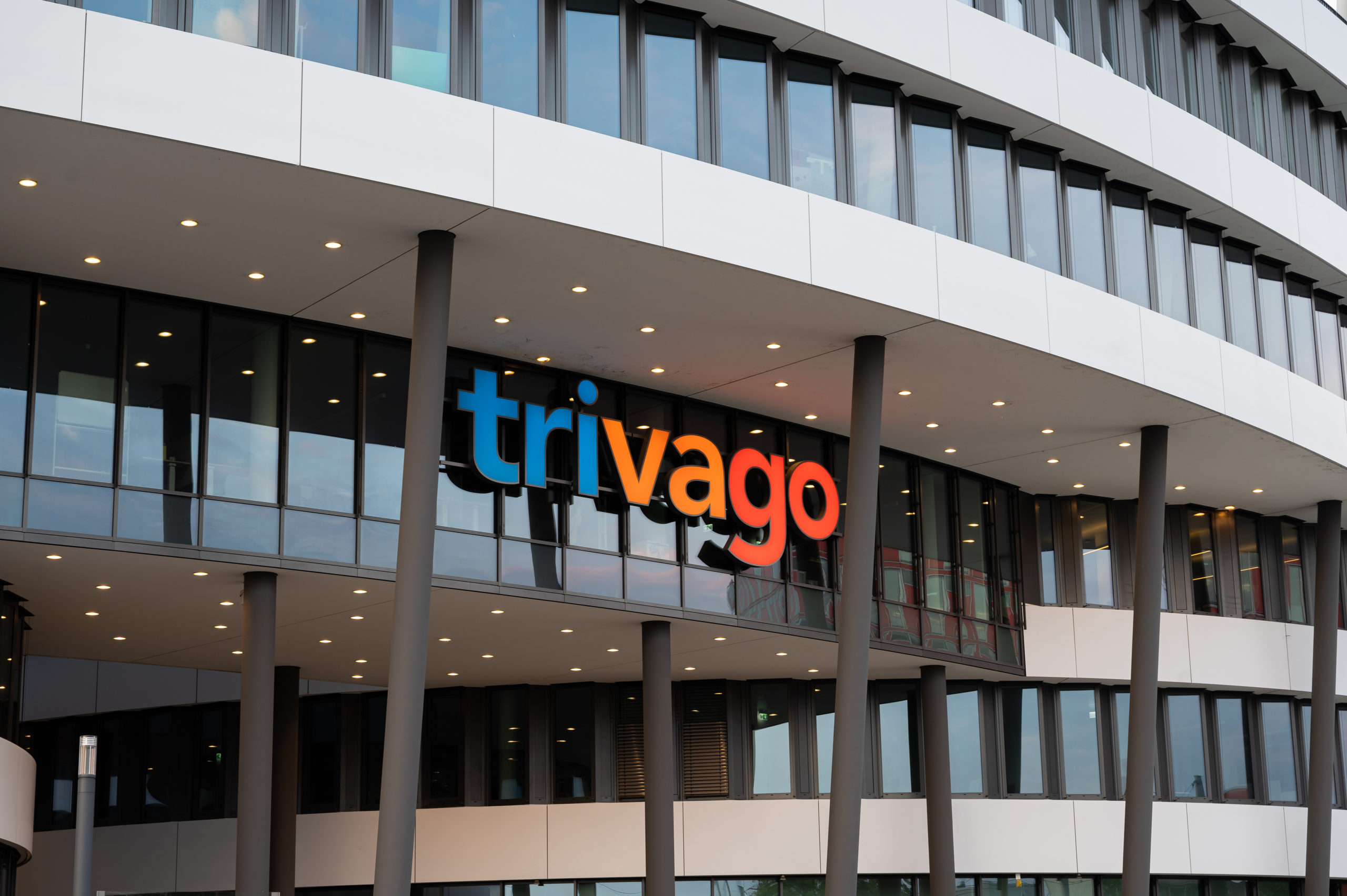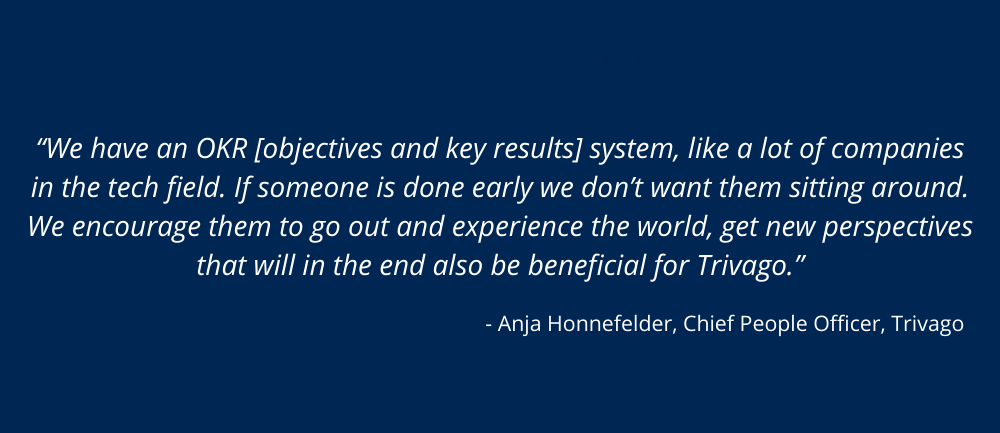-
Provided by

- Date published: Dec 8, 2021
- Categories
Trivago is one of the world’s biggest travel booking platforms with over 4 million monthly visits in the UK alone. Over recent months the company has attracted scrutiny for its pursuit of hybrid working, rather than the remote model favoured by many of its tech counterparts.
Here Anja Honnefelder, Trivago’s chief people officer and legal counsel, explains the reasons for the hybrid policy and reveals the key policies the company has put in place to make it work.
When Twitter CEO Jack Dorsey told the world that his employees could now “work from home forever” in May 2019, it felt almost like a self-fulfilling prophecy. Companies like Twitter had made remote working possible with their digital innovations; now these Silicon Valley behemoths were going to lead the revolution themselves.
Over the last few months, more and more tech giants have followed Dorsey’s lead. According to the Build Remote website, Facebook, Slack, Upwork, Hubspot and Microsoft have all accepted remote working for at least part of their workforce. But amidst the great migration some tech companies have opted to stay put, defying the zeitgeist by sticking true to their old office-based models.
One of those companies is Trivago. The travel search platform brought 700 employees back to its Dusseldorf headquarters in Autumn 2020, once the German authorities had given the green-light. It has since piloted a hybrid work blueprint, with fixed requirements governing the time each team member must spend in the office each month.
This approach might seem counter-intuitive, a failure to maximise the benefits of distance working… the bottomless talent pool, the 24-hour productivity, the work-life balance that so appeals to younger job-seekers. But for Anja Honnefelder, Trivago’s people lead, the strength of the company culture is just as important.
Bringing people together
“We come from an in-person culture,” says Anja, who joined Trivago from law firm Freshfields Bruckhaus Deringer in 2016. “That’s also why we have an enormous headquarters, a beautiful campus with a gym, a running track on the rooftop, with a canteen that offers 12 live cooking stations and subsidised fresh food… we did that because we are a very international company with more than 70 nationalities, and we bring them all together in our German headquarters.
“We feel this brings all perspectives together and it leads to quicker decision-making, which fuels innovation. So we said ‘we think there’s a huge benefit to the company in being together and working in person.’”
The company has certainly seen huge benefits to remote working over the last 18 months; Anja says her colleagues “like this new work-life balance they have, especially families.” However, when Trivago asked its people how they want to work in the post-lockdown era, the desire for a return to some form of office life became clear.

“We have surveys, we have Office Vibe which samples employees once a week and we have a desk booking tool, which also allows us to monitor which areas are used when and how often, how much capacity we have,” Anja says. “On top of that, we check how many people came to campus.
“There was a big spectrum [in the surveys]. Some people want to be fully remote, others really don’t want to work from home and want to try and bring back, as much as we can, the days where we are all working at the campus every day. But the majority of people said they would like to have two, maximum three days in the office and the rest flexible.
“The talent and culture team talked to a lot of people in the company, people who just recently joined, people in between and people in between, and asked them why they’re here and what they enjoy. All of them mentioned their peers for at least one reason – they were able to meet these great people and have these strong relationships, and they learn from one another in a collaborative culture. That data-point was so prominent that it was clearly an asset, so we didn’t want to give up on that interaction.”
The roots of the policy
Initially, the people leadership team tested the concept of a ‘homecoming week’ each month; everyone was expected in the office and they would receive benefits such as free food and sports classes. However, the feedback was mixed. People who don’t live close to our offices liked it because they have the flexibility to move to other cities,” Anja recalls, “but the people who actually live here and have a regular life, they felt it was unnatural.”
So a new approach was trialled, one that drew heavily on the wishes expressed in Trivago’s survey. Under the terms of the new employee contract, every team member is expected to work two days a week in the office with the rest of their team, and the rest of the week is flexible. It is up to each team to decide their office days.
Only one person, an inaugural Trivago employee, is exempt from the arrangement. “We are very careful with exceptions. Exceptions frustrate other people who feel they would be entitled to the same set-up but in the end are not. It just creates a lot of complexity.

By ensuring that entire teams are working the same pattern, Trivago hopes to ensure joined-up productivity. Anja says she and her colleagues “want team collaboration. We don’t want a situation where people come to the office and half the team is not there.”
One of the top priorities is to ensure fair, coordinated meetings. When teams are in the office, everyone is expected to attend the meeting in person; when they are on one of their flexible days, everyone is expected to dial in, even those who have decided to come into the office. This way, those working remotely can see all the faces on screen and everyone has the same visibility privileges.
With this approach, Trivago hopes to avoid the problems that have been documented elsewhere. Various articles have highlighted the disadvantage of remote workers at meeting time; telecommuters feel marginalised, particularly when they see their colleagues sharing jokes in the office.
“This is the worst of both worlds”, Anja says. “Going fully remote is easier [for meetings] because everyone is the same, everyone is on a screen and all the information has to go through the screen.
“If you go for hybrid, you tend to have one group that tends to be more in the office and has access to more information, and maybe other benefits. Maybe they’re able to build stronger relationships within the company.
“You need to balance it out so people who tend to be a bit more remote and make use of the flexibility they have are not overlooked when it comes to career progression and so on.”

A mix of fixed and flexible
Continuing on this theme, Trivago has also tried to create uniformity in its working hours, and ensure that everyone – whether they’re working in the office at home – is working to the same fixed, repeatable pattern.
In the new remote age, it’s all too easy for employees to be sucked into emails and direct messages late at night. Those who enjoy working late, are scrambling to hit a deadline or want to impress their boss may increase their colleagues’ risk of burnout; recent research from Microsoft showed that the average time between an employee’s first and last work task of the day had increased by 10% during the pandemic. Anja and her colleagues are keen to avoid this.
“We try to encourage people not to be active and send messages in the evenings, outside business hours,” Anja explains. “We also had a ‘no-Zoom noon’, a period of one hour during lunchtime when we encouraged everyone to do meetings over the phone when they were out walking or at home cooking a healthy meal, to break up the day a bit better.”
However, Trivago is much more flexible when it comes to holidays. In fact, employees are allowed to take as much time off as they want, providing their line manager signs off.

This laissez faire approach is very much on-trend. A growing number of companies have adopted unlimited holidays in recent months, many of them remote-friendly. In fact, 47% of the firms that made Quartz’s most recent ‘Best Companies for Remote Work’ list offer unlimited vacation time (the practice remains far less common for ‘traditional’ companies).
Critics argue that the unlimited-holiday policy exposes productivity gaps, penalises the workaholics and unfairly rewards those rich enough to take regular trips abroad. However, advocates suggest it shows trust. In a well-calibrated company, they insist, people will treat their freedom responsibly. This is certainly Anja’s experience.
“If we give this flexibility and freedom there may always be a couple of people who abuse it. But we have learned that the trust you give to people is generally not abused, but valued, and people take it with responsibility. [In any case] if you are working on an OKR system and someone is constantly not meeting objectives, in the long-run they will not be a good fit for the company.
“We did an analysis two or three years ago and the average number of vacation days [taken by Trivago staff] was 32 or so, so slightly above average but still totally in line with what other companies in Germany give as a maximum. In Germany you usually have 25-30 days.”
The office attraction
But what about the attractions for staff in the office, the initiatives and amenities that have been put in place to rebuild the community after Covid-19? Here, it is clear that Anja and her team have invested a huge amount of time and effort.
The after-work drinks are back up and running, as are the ‘Trivago Fridays’ where staff can hear a deep dive on a specific topic and listen to live music. And every quarter the company runs a core event, bringing everyone together to join a specific activity. One of the is known as Trivago on Tour, a bonding exercise which invites all employees to spend two or three days in a surprise location.
But perhaps even more important are the pop-up activities, the one-to-one meetings that create real relationships between team members. After all the disruption of Covid, these events are crucial to Trivago’s hybrid model.

“We are trying to create incentives so people interact and come more often to campus, even if it’s not the two standard days,” Anja says. “For example we have a peer-to-peer praise system, and it is now connected to a coffee voucher. So if you have done something really cool for another person, they can praise you via Slack and you will receive a coffee voucher, along with the person who has praised you, and you will have a coffee together in the office. This is designed to encourage collaboration.
“As you can imagine, the last one and a half years have been quite challenging. We also used the time to work on new products, to get stronger out of the crisis, and we introduced one week in summer and one week in winter, Trivacation and Christmas in winter, where the whole company is not operating. You’re not supposed to send any slack messages or emails and people get just one week off. It actually led to a lot of loyalty and gratitude among our employees.”
The great debate continues…
More than eighteen months after the eruption of the pandemic, the great productivity debate continues to rage. For every think-piece that claims remote working makes us more efficient, there’s an interview with a disgruntled boss who claims their staff are abusing their new telecommuting privileges.
Anja, for her part, sees the benefits on both sides. “You will have days where working from home is more productive because you don’t have so many people talking to you but on the other hand, you’ll have lots of meetings which take 15-30 minutes whereas in the office you can just go and talk to a colleague across the desk.
“The productivity in the office isn’t always as felt but it’s paid out later. You create relationships that make you quicker in the future because it’s easier to talk to other people in the company that you wouldn’t have met at home.”
So it’s no surprise to hear that Trivago plans to stick with its hybrid model. Anja says the current approach is quite “rigid” but adds that “as soon as the routine has been built up and people get used to social, in-person interactions again, and people also see the benefits of being on-site, on-campus, we will survey our people and see what they want to do.
“What I would like to do is move into a bit more of a flexible model. Let’s say teams would be required to meet in-person, on-campus for a certain percentage of time per month, but how they structure that – whether it’s one week, a couple of days in a row or a couple of days here and there – is totally up to them. Every team has a different way of working and may need a different setup.”
It may not be as remote-centric as the approach other tech companies have taken, but it’s very much in keeping with the overall drift: greater choice, greater flexibility and greater flexibility. Trivago’s direction of travel may be different to that of its peers, but the destination may end up being very similar.
